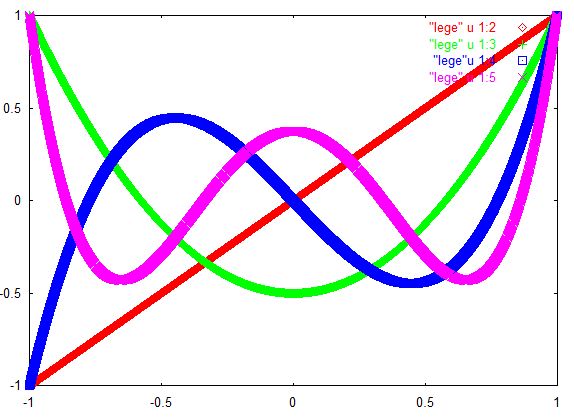Download different year question paper
1.0
#include<iostream>
#include<cmath>
#include<stdlib.h>
using namespace std;
FILE*cplab;
double sinc(double x, int m){ // 3rd Year 2007, April 11, 2009
double val=0.0;
int n=0;
for(n=1 ;n<=m;n++){
val+=powf(-1,n+1)*sin(n*x)/n;
}
return 2*val;
}
int main(){
cplab=fopen("last21","w");
double n=0;
double x=0.0, val=0.0,sgn=1.0;
for(x=-M_PI; x<=M_PI; x+=M_PI/2000){
fprintf(cplab,"%lf %lf %lf %lf %lf %lf %lf %lf \n",x,sinc(x,2),
sinc(x,3),sinc(x,4),sinc(x,5),sinc(x,6),sinc(x,7),sinc(x,8));
}
fclose(cplab);
return 0;
}
2.0
#include <iostream>
#include<cmath>
#include<stdlib.h>
using namespace std ; // 3rd Year B.Sc., April 11, 2009
FILE*cplab;
int N=10;
double mygaussian(double a){
double la, ub, frac;
int n;
double arry[N+1];
double x0, val, h;
frac=1/sqrt(2*M_PI);
la=-a;
ub=a;
h=(ub-la)/N;
for(n=0; n<=N ; n++){
x0=la;
arry[n]=exp(-x0*x0/2.0);
la=x0+h;
}
return frac*(h/3.0)*( (arry[0]+arry[10])+ 4*(arry[1]+arry[3]+arry[5]+arry[7]+
arry[9])+2*(arry[2]+arry[4]+arry[6]+arry[8]));
}
int main(){
cplab=fopen("gaussion","w");
double a;
for(a=-2.0 ; a<=2.0; a+=0.01){
fprintf(cplab,"%lf %lf \n", a , mygaussian(a));
}
fclose(cplab);
return 0;
}
#include<iostream> //Exam Ques 2008
#include<stdio.h>
#include<cmath>
#include<stdlib.h>
using namespace std;
FILE*cplab; // Exam Date October 21,2009
double fac(int n){
if (n==0) return 1;
else return n*fac(n-1);
}
double mylegen(int n, double x){
int s;
double val=0.0;
for(s=0; s<=(n/2); s++){
val+=powf(-1,s)*fac(2*n-2*s)*powf(x,n-2*s)/( powf(2,n)*fac(s)*fac(n-s)*fac(n-2*s));
}
return val;
}
int main(){
cplab=fopen("lege","w");
double x;
for(x=-1.0; x<=1.0; x+=0.0001){
fprintf(cplab,"%lf %lf %lf %lf %lf \n",x,mylegen(1,x),mylegen(2,x),mylegen(3,x),mylegen(4,x));
}
fclose(cplab);
return 0;
}
The figure is like this
4.0
Write a C++ code to evaluate the error function
#include<iostream>
#include<stdio.h>
#include<cmath>
using namespace std;
int N=10;
double erf(double x){ // http://en.wikipedia.org/wiki/Error_function
double a, b,frac ;
int n;
double arry[N+1];
double x0, val, h;
frac=2.0/sqrt(M_PI);
a=0;
b=x;
h=(b-a)/N;
for(n=0; n<=N ; n++){
x0=a;
arry[n]=exp(-x0*x0);
a=x0+h;
}
return frac*(h/3.0)*( (arry[0]+arry[10])+ 4*(arry[1]+arry[3]+arry[5]+arry[7]+arry[9])
+2*(arry[2]+arry[4]+arry[6]+arry[8]));
}
int main(){
cout<<erf(2.0)<<endl;
return 0;
}
#include<iostream>
#include<stdio.h>
#include<cmath>
using namespace std;
int N=10;
double erf(double x){ // http://en.wikipedia.org/wiki/Error_function
double a, b,frac ;
int n;
double arry[N+1];
double x0, val, h;
frac=2.0/sqrt(M_PI);
a=0;
b=x;
h=(b-a)/N;
for(n=0; n<=N ; n++){
x0=a;
arry[n]=exp(-x0*x0);
a=x0+h;
}
return frac*(h/3.0)*( (arry[0]+arry[10])+ 4*(arry[1]+arry[3]+arry[5]+arry[7]+arry[9])
+2*(arry[2]+arry[4]+arry[6]+arry[8]));
}
int main(){
cout<<erf(2.0)<<endl;
return 0;
}
5.0
#include<iostream>
#include<cmath>
using namespace std;
FILE*cplab;
double confrac(int p, int n){
if (n==0) return p;
else return p + p/confrac( p, n-1 );
}
int main(){
cplab=fopen("confra","w");
int n;
for( n=2; n<=20; n+=2 ){
fprintf(cplab,"%d %lf %lf \n",n,confrac(2,n),confrac(3,n));
}
fclose(cplab);
return 0;
}
6.0
#include<iostream>
#include<cmath>
using namespace std;
FILE*cplab;
double full(double t){ // For more info look MMP book, Arfken, sec -14.3.2
int n;
double val=0.0;
for(n=2; n<=12; n+=2){
val+=cos(n*t)/(n*n-1); // we have used w=1, or wt along the x axis
}
return (2.0/M_PI)-(4.0/M_PI)*val;
}
int main(){
cplab=fopen("fou4","w");
double t;
for( t=-2*M_PI; t<=2*M_PI; t+=M_PI/2000 ){ // We have taken the increment Pi/2000
fprintf(cplab," %lf %lf \n", t , full(t));
}
fclose(cplab);
return 0;
#include<iostream>
#include<cmath>
using namespace std;
FILE*cplab;
double confrac(int p, int n){
if (n==0) return p;
else return p + p/confrac( p, n-1 );
}
int main(){
cplab=fopen("confra","w");
int n;
for( n=2; n<=20; n+=2 ){
fprintf(cplab,"%d %lf %lf \n",n,confrac(2,n),confrac(3,n));
}
fclose(cplab);
return 0;
}
6.0
#include<iostream>
#include<cmath>
using namespace std;
FILE*cplab;
double full(double t){ // For more info look MMP book, Arfken, sec -14.3.2
int n;
double val=0.0;
for(n=2; n<=12; n+=2){
val+=cos(n*t)/(n*n-1); // we have used w=1, or wt along the x axis
}
return (2.0/M_PI)-(4.0/M_PI)*val;
}
int main(){
cplab=fopen("fou4","w");
double t;
for( t=-2*M_PI; t<=2*M_PI; t+=M_PI/2000 ){ // We have taken the increment Pi/2000
fprintf(cplab," %lf %lf \n", t , full(t));
}
fclose(cplab);
return 0;










No comments:
Post a Comment